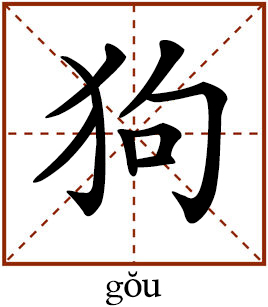Dogs

Dogs are called gou and large ones were also called quan (犬) in the past. These two words are used interchangeably today. The word “犬” has become a component of scores of words related to animals and hunting, including wolf (狼), fox (狐狸), lion (狮), hunting (猎) and hunting in winter (狩).
黄耳传书
Huáng’ěr chuán shū
Huang’er, meaning yellow ears, was the name of the dog of Lu Ji (261-303), a prominent writer during the Western Jin Dynasty. Chuan means “to deliver” while shu means “family letters.” This idiom, taken literally, means sending a family letter by Huang’er.
According to Records on the Wonders by Ren Fang (460-508), Lu Ji kept a dog named Huang’er when serving as a government official in the capital city of Luoyang. Because he had not received any letters from his family in the Wu area, he asked Huang’er in jest: “I haven’t heard from my family for a long time. Can you send letters and bring back news about my family?” Amazingly, the dog wagged its tail and barked in response. Lu then wrote a letter and put it into the bamboo tube hanging on the neck of Huang’er. The distance as the crow flies between Luoyang and Lu’s family is over 500 kilometers. Huang’er delivered the letter and brought back the letter in reply in around a month.
This idiom is used to mean sending family letters by Huang’er or simply writing letters to someone. The term Huang’er is later used to refer to messengers. Family letters are called quan letters, meaning letters sent by dogs or dog’s letters.
犬子
quăn zĭ
Quan referred to dogs. Zi means “sons.” This idiom, taken literally, means dog-like sons.
According to the Records of the Grand Historian by Sima Qian in the Han Dynasty, Sima Xiangru (c.179-c.118 BCE), one of the greatest composers of Chinese fu rhapsodies, loved reading books and fencing. His parents loved him and named him Quanzi. As Sima became famous for his literary achievements, his pet name also became popular.
The idiom is now used to refer to one’s own son in a self-deprecating manner.
(edited by CHEN ALONG)
